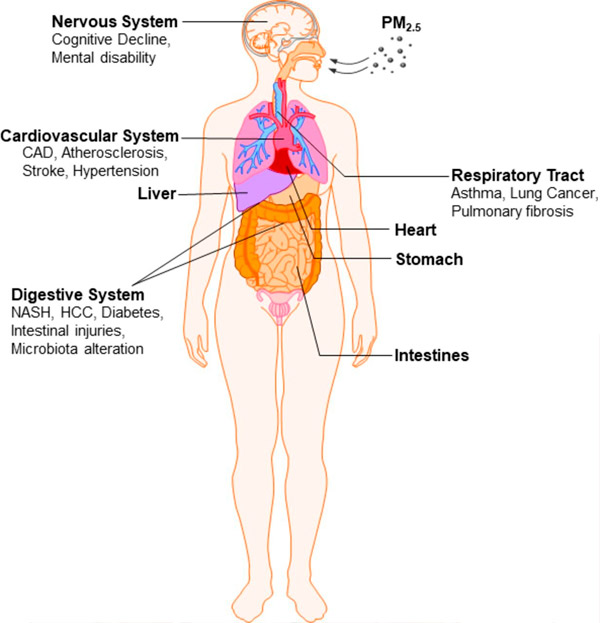Nye publikasjoner
Hvordan påvirker luftforurensning fordøyelsessystemet?
Sist anmeldt: 02.07.2025

Alt iLive-innhold blir gjennomgått med medisin eller faktisk kontrollert for å sikre så mye faktuell nøyaktighet som mulig.
Vi har strenge retningslinjer for innkjøp og kun kobling til anerkjente medieområder, akademiske forskningsinstitusjoner og, når det er mulig, medisinsk peer-evaluerte studier. Merk at tallene i parenteser ([1], [2], etc.) er klikkbare koblinger til disse studiene.
Hvis du føler at noe av innholdet vårt er unøyaktig, utdatert eller ellers tvilsomt, velg det og trykk Ctrl + Enter.

Fine partikler, mindre enn 2,5 mikrometer i diameter (PM2.5), er de viktigste luftforurensningene som er forbundet med ulike helseproblemer. Disse partiklene kan trenge dypt inn i lungene og til og med komme inn i blodomløpet ved innånding. Nyere studier viser en alvorlig helsetrussel: eksponering for PM2.5 kan også skade fordøyelsessystemet, inkludert lever, bukspyttkjertel og tarmer.
Nyere studier har fokusert på hvordan PM2.5-eksponering utløser stressresponser i celler i fordøyelsessystemet. Disse responsene involverer spesialiserte subcellulære strukturer i celler kalt organeller, som endoplasmatisk retikulum (ER), mitokondrier og lysosomer. Når PM2.5 forstyrrer disse organellene, skaper det en kjedereaksjon i cellene som kan føre til betennelse og andre skadelige effekter.
Leveren, et nøkkelorgan for avgiftning og metabolisme, er spesielt utsatt for skader fra PM2.5. Forskning har vist at eksponering for PM2.5 kan føre til en rekke problemer i leveren, inkludert betennelse, stressresponser, organellskader og svekket energimetabolisme. Disse effektene kan bidra til utviklingen av ikke-alkoholisk fettleversykdom (NASH) og type 2 diabetes.
Effektene av PM2.5 er ikke begrenset til leveren. Det kan også skade bukspyttkjertelen og tarmene. Studier har knyttet PM2.5 til økt risiko for bukspyttkjerteldysfunksjon hos personer med diabetes, samt skade på tarmceller og økt permeabilitet. Denne økte permeabiliteten kan føre til en rekke fordøyelsesproblemer.
Selv om den nyeste forskningen gir verdifulle data, gjenstår det viktige spørsmål. Forskere fortsetter å studere hvordan celler oppfatter PM2.5 og hvordan stressresponsen varierer på tvers av ulike organer i fordøyelsessystemet. De undersøker også hvordan PM2.5-eksponering påvirker samspillet mellom ulike organer i fordøyelsessystemet, noe som kan påvirke den generelle fordøyelsesfunksjonen.

Til slutt undersøker forskere om kostholds- eller farmasøytiske tiltak kan redusere skadene fra PM2.5. Interessant nok tyder noen studier på at visse næringsstoffer, som enumettede fettsyrer og vitaminer, kan gi en viss beskyttelse mot de skadelige effektene av PM2.5.
Luftforurensning er et komplekst problem uten enkle løsninger. Selv om forskningen fortsetter, fremhever reduksjon av PM2.5 og den nåværende forståelsen av dens innvirkning på fordøyelsessystemet de vidtrekkende konsekvensene av luftforurensning på menneskers helse. Dette understreker behovet for fortsatt innsats for å redusere luftforurensning og utvikle strategier for å beskytte mot dens skadelige effekter.
Studien ble publisert i tidsskriftet eGastroenterology.
